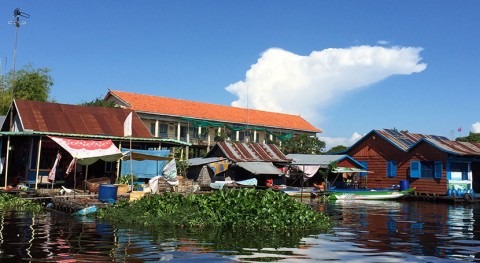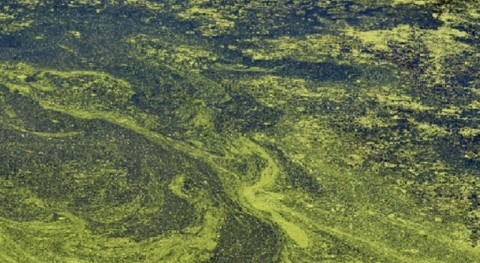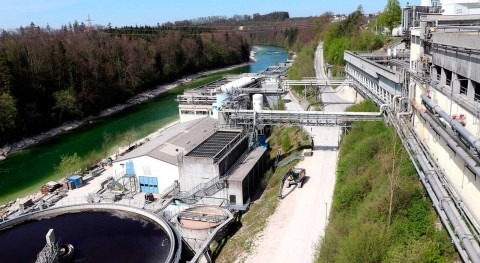The secret to predicting viral outbreaks like COVID-19 might be in our sewers. A Michigan State University researcher is spearheading a study to determine if viral outbreaks can be identified and forecasted through wastewater sampling.
Funded by the Great Lakes Water Authority, MSU’s Irene Xagoraraki is using a method from one of her recently completed studies to test and predict COVID-19 in Detroit that can deliver warnings of potential outbreaks even before they appear in health facilities.
“If our prediction models are showing early warning signals of a problem, we could sound the alarm for state and federal authorities to prepare for an outbreak,” said Xagoraraki, associate professor in environmental engineering at MSU. “The medical community needs to be armed with resources to help these communities and early action might be one of the answers.”
For the initial study, funded by the National Science Foundation, Xagoraraki evaluated human viral pathogens excreted by the Detroit population that were collected from untreated wastewater samples between November 2017 to February 2018.
“We developed two models; the first, a viral identification model, or Viral-ID, determines diversity and genetic makeup of viral infections in a certain population at a particular point in time,” Xagoraraki said. “The second, a viral prediction model, or Viral-PD, provides early signals of fluctuations of target viral diseases, such as hepatitis, COVID-19 and others, in certain geographical areas over time.”
Using Viral-ID in the untreated wastewater, Xagoraraki was able to identify a number of enteric, respiratory, bloodborne and vector-borne viruses ranging from norovirus to human herpesviruses 8 (Kaposi’s sarcoma associated herpesvirus), the latter attributed to an HIV-AIDS outbreak in Detroit during the sampling period. Genetic sequences of multiple reported viral-related diseases in the Detroit population during the sampling period, found in clinical records reported by the state, were found in wastewater.
When testing the Viral-PD model, concentrations of hepatitis A in wastewater – along with multiple other parameters – were correlated with clinical data.
“Increases in hepatitis A incidence in the surrounding community were revealed in wastewater approximately seven to nine days before cases were detected and reported by health care facilities,” Xagoraraki said.
With the success of her first phase of research, Xagoraraki and her team are collecting samples weekly and measuring concentrations of beta coronavirus SARS-CoV2 (known as the novel coronavirus, or COVID-19) in wastewater. Assisting are MSU doctoral candidates Brijen Miyani and Camille McCall; recent graduates Huiyun Wu and Evan O’Brian; and the Great Lakes Water Authority and the Detroit Water and Sewerage Department.
Xagoraraki said a critical component of genetic testing in environmental samples is concentrating and cleaning a sample to remove chemical or microbial contamination typically not found in a clinical sample.
To estimate virus detention times in the sewer collection network, hydrological and other network data are analyzed and modeled; to estimate contributing population, biomarkers and excreted metabolites are measured. Population health data and COVID-related characteristics, such as incubation times and shedding rates, are being collected and modeled to estimate delays between measured viral concentrations in wastewater and appearance of disease symptoms.
Results from Xagoraraki’s initial study can be seen in One Health, Water Research and Journal of Environmental Engineering.
“If the predictive capability is validated for SARS-CoV-2, this method might provide a means to mitigate the current pandemic by enabling public health officials to act before an outbreak spreads farther, enabling the economy to stay open longer in the absence of expensive and time consuming massive testing,” said John Verboncoeur, associate dean for research in the College of Engineering. “In the longer term, this method might provide an early warning system to limit the effects of an emerging epidemic before it gets started, with multiple sites providing a spatiotemporal picture of the early spread of pathogens at low cost.”
Xagoraraki is also working with the Institute for Global Health in the MSU College of Osteopathic Medicine to extend this to international locations.
According to Xagoraraki, this international work is critical as underserved populations in developing countries often don’t seek or have access to medical care and outbreaks often go undetected. In such locations, in addition to centralized wastewater sampling, the team plans to include watershed sampling in critical locations to assess the viral load and viral diversity of the portion of the population that is not serviced by public utilities.
“The implications for being able to detect viral shedding in wastewater before outbreaks of illnesses could guide future public health and public policy decisions related to epidemics and pandemics in these developing countries,” said William Cunningham, associate dean for global health in the College of Osteopathic Medicine.
“Everything we’re doing is at the research-level at this point – however, it could be part of a larger solution across the country and world,” Xagoraraki said. “Our models are expected to describe patterns of endemic disease, identify potential novel viruses, and predict hot spots and critical moments for the onset or spread of outbreaks prior to full-blown demonstration of disease.”













